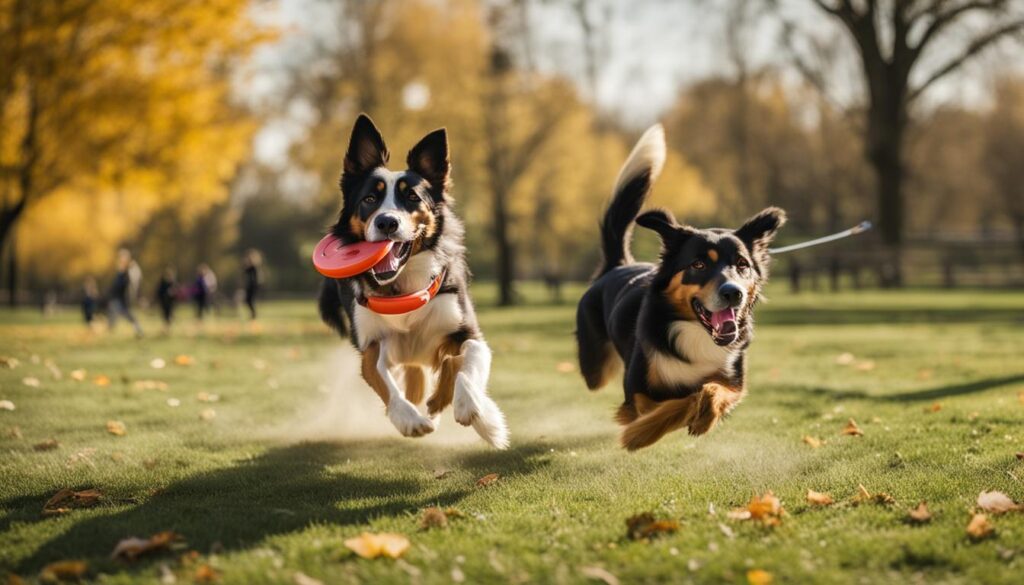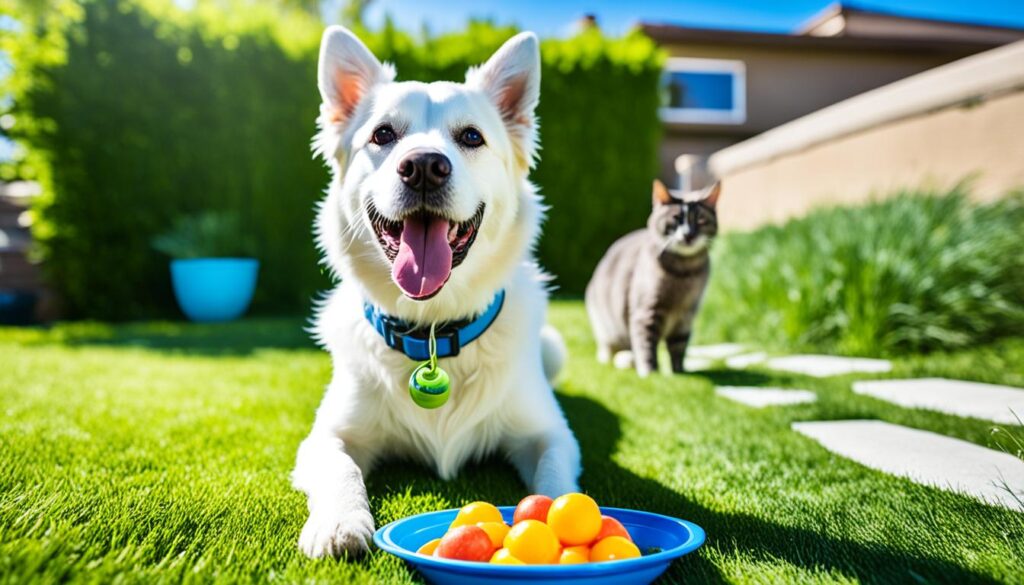Greetings, pet owners! As a passionate pet lover, I understand the importance of ensuring our furry friends’ health and well-being. One of the most prevalent and concerning health issues in pets today is obesity. Not only does it shorten their lifespan, but it also contributes to chronic pain and various other health complications. The good news is that obesity is preventable, and even if your pet is already overweight or obese, the disease can be reversed.
So, how can we keep our pets in tip-top shape and maintain a healthy weight for them? In this article, I will share with you valuable tips and expert advice to help prevent obesity and promote overall wellness in pets. From proper nutrition and exercise to stress management and veterinary check-ups, we will explore all the essential aspects of pet health and weight management.
Key Takeaways:
- Choose the right food and ensure portion control for your pet.
- Regular exercise is crucial for maintaining a healthy weight.
- Understanding the consequences of pet obesity can motivate action.
- Proper nutrition is essential for overall pet health and weight management.
- Veterinary check-ups and preventive healthcare are vital in preventing obesity.
Understanding Pet Obesity and its Consequences
Pet obesity is a prevalent issue that affects both dogs and cats. It not only impacts their quality of life but also exposes them to various health risks. Overweight pets are more susceptible to conditions such as diabetes, arthritis, heart disease, and respiratory problems.
Studies have shown that pet obesity can shorten their lifespan and contribute to chronic inflammation and pain. Just like humans, pets need a healthy weight to maintain optimal health and well-being.
Understanding the consequences of pet obesity is crucial in motivating pet owners to take necessary steps to prevent it. By recognizing the risks associated with overweight pets, owners can make informed decisions and prioritize their pet’s health and wellness.
Proactively managing your pet’s weight and ensuring they maintain a healthy body condition can significantly improve their overall health and extend their lifespan. This involves a combination of proper nutrition, regular exercise, and veterinary care.
“Overweight pets are more prone to conditions such as diabetes, arthritis, heart disease, and respiratory problems.”
The Importance of Proper Nutrition in Pet Health
Proper nutrition is essential for maintaining optimal health in pets. Providing a balanced and nutritious diet is key to preventing obesity and promoting overall well-being. Pet nutrition is a vital component of pet care, and understanding the dietary needs of your pet is fundamental to their health and longevity.
Pet Nutrition Advice for Optimal Health
When it comes to pet nutrition, it’s important to consider their age, breed, size, and any specific dietary requirements they may have. Consulting with a veterinarian can provide valuable guidance on the nutritional needs of your pet.

Incorporating a variety of foods into your pet’s diet is crucial to ensure they receive all the essential nutrients they need. A balanced meal for pets typically includes high-quality proteins, whole grains, vegetables, and essential fatty acids. Pet owners should strive to provide their pets with a well-rounded diet that meets their specific nutritional needs.
How to Choose the Right Food for Your Pet
Choosing the right food for your pet can be overwhelming with the plethora of options available. It’s important to select pet food that is formulated for their specific dietary needs and life stage. Look for pet food brands that prioritize high-quality ingredients and have a proven track record of providing balanced nutrition.
Reading the labels and understanding the ingredients in pet food is crucial for making informed choices. Look for ingredients such as real meat, whole grains, and natural additives. Avoid foods that contain excessive fillers, artificial preservatives, and colors.
The Role of Portion Control in a Healthy Pet Diet
Portion control plays a significant role in maintaining a healthy weight for pets. Every pet has different energy requirements, so it is essential to consult with your veterinarian to determine the appropriate portion size for your pet’s specific needs. Overfeeding can lead to weight gain and obesity, while underfeeding can result in malnutrition.
It’s important to follow the portion control guidelines provided by your veterinarian and measure your pet’s food accurately. Avoid free-choice feeding, where food is available to the pet at all times, as it can lead to overeating. Instead, divide the daily portion into multiple meals throughout the day to promote better digestion and prevent excessive calorie intake.
By prioritizing proper nutrition, pet owners can contribute to the overall well-being and longevity of their furry friends. A balanced and nutritious diet, coupled with portion control, is key to maintaining a healthy weight and preventing obesity in pets.
Exercise: A Cornerstone for Pet Wellness
Exercise plays a crucial role in maintaining the overall wellness of pets. Regular physical activity not only helps pets burn calories, but also helps them maintain a healthy weight and strengthen their muscles and joints. It is an essential aspect of pet care that should not be overlooked.
Engaging in activities such as walks, runs, playtime, and interactive toys offers numerous benefits for our pets. Here are some of the key advantages of pet exercise:
- Physical Health: Regular exercise helps pets maintain a healthy weight, reducing the risk of obesity and associated health issues such as diabetes, heart disease, and joint problems.
- Mental Stimulation: Physical activity provides mental stimulation and enrichment, preventing boredom and reducing the likelihood of behavioral problems.
- Bonding Time: Exercise is a great opportunity for pet owners to bond with their furry companions, strengthening the human-animal bond.
- Socialization: Walking or playing with other pets can help improve socialization skills and reduce anxiety in pets.
To ensure that pets get the exercise they need, it’s important to incorporate physical activity into their daily routines. This can include regular walks or jogs, interactive play sessions, or using toys that encourage movement. It’s important to tailor the exercise routine to the specific needs of each pet, taking into consideration their age, breed, and any existing health conditions.
Providing opportunities for both mental and physical exercise is essential for the overall well-being of our beloved pets. By making exercise a regular part of their routine, pet owners can contribute to their pets’ overall health and happiness. Stay tuned for the next section, where we explore how to implement these pet wellness tips into daily life.
Implementing Pet Wellness Tips into Daily Routines
Creating a pet wellness routine is an essential part of maintaining your pet’s overall health and well-being. By incorporating daily pet care practices into your routine, you can ensure that your furry friend stays happy and healthy. This section will provide guidance on incorporating pet exercise routines and implementing a pet stress management plan.
Incorporating Pet Exercise Tips into Daily Life
Pet exercise is vital for both physical and mental stimulation. Just like humans, pets need regular physical activity to maintain a healthy weight and prevent obesity-related issues. Here are some tips to help you incorporate pet exercise into your daily life:
- Take your dog for daily walks or runs. This not only provides exercise but also promotes bonding and socialization.
- Engage in interactive playtime with your pet using toys and games that encourage movement and mental stimulation.
- Consider enrolling your pet in obedience training or agility classes, which provide structured exercise and enhance their mental abilities.
- Provide your cat with vertical spaces such as cat trees or shelves to encourage climbing and jumping, fulfilling their natural instincts.
- Rotate your pet’s toys regularly to keep them engaged and interested in playtime.
Remember, each pet is unique, so adjust the exercise routine according to their age, breed, and overall health condition. Consulting with your veterinarian can help you create a personalized exercise plan that suits your pet’s specific needs.
Create a Pet Stress Management Plan
Just like humans, pets can experience stress and anxiety. It is essential to create a stress management plan to help your pet cope with these emotions effectively. Here are some strategies to incorporate into your pet’s daily routine:
- Provide a safe and calm environment for your pet, ensuring they have a designated space to retreat to when feeling stressed.
- Establish a consistent daily routine, including feeding, exercise, and playtime. Predictability and structure can help alleviate stress.
- Use positive reinforcement training techniques to instill confidence and reduce anxiety in your pet.
- Implement stress-relief methods such as massage, aromatherapy, or music designed to soothe pets.
- Consider using interactive feeding toys or puzzles that require mental engagement, providing a sense of achievement and reducing stress.
Observing your pet’s behavior and body language is crucial in identifying signs of stress. If your pet consistently exhibits stress-related symptoms, consult with your veterinarian for additional guidance and support.
By incorporating pet exercise routines and implementing a pet stress management plan into your daily life, you can provide your furry friend with the care they need to lead a healthy and fulfilling life.

The Role of Regular Veterinary Check-Ups
Regular veterinary check-ups are essential for maintaining the health and well-being of pets. These check-ups play a vital role in preventing obesity and addressing any underlying health issues that may contribute to weight gain. During these routine exams, veterinarians assess the weight of pets, provide valuable nutritional advice, and offer guidance on maintaining a healthy weight. Vaccinations, parasite prevention, and routine screenings are also important components of preventive healthcare for pets.
By scheduling regular veterinary check-ups, pet owners can ensure that their furry companions receive the necessary preventive care and stay on track for a healthy and active lifestyle. These check-ups serve as an opportunity for early detection of potential health concerns, allowing for prompt intervention and treatment. Additionally, veterinarians can provide tailored recommendations specific to a pet’s age, breed, and individual needs to support overall well-being.
Natural Pet Remedies for Weight Management
Natural pet remedies can be effective in managing weight and promoting overall wellness in pets. Taking a holistic approach to pet health is essential in ensuring their well-being and maintaining a healthy weight. In this section, I will explore holistic pet health practices and discuss the integration of natural supplements into your pet’s diet to support weight management and improve their overall health.
Exploring Holistic Pet Health Practices
Holistic pet health practices focus on treating the whole pet, considering their physical, emotional, and mental well-being. These practices can be beneficial in maintaining a healthy weight for your pet. Some holistic approaches to consider include:
- Acupuncture: Acupuncture can help stimulate the body’s energy flow, promoting weight management and overall wellness.
- Massage: Massage therapy can aid in relaxation, improve circulation, and potentially contribute to weight management in pets.
- Chiropractic Care: Chiropractic adjustments can help align the pet’s spine, promoting overall physical health and potentially aiding in weight management.

Integrating Natural Supplements into Your Pet’s Diet
In addition to holistic practices, integrating natural supplements into your pet’s diet can further support weight management and overall health. Natural supplements can provide essential nutrients and support various bodily functions. Consider incorporating the following into your pet’s diet:
- Herbal Remedies: Herbal remedies, such as green tea extract or dandelion root, can aid in weight management by boosting metabolism and promoting digestion.
- Probiotics: Probiotics help maintain a healthy gut environment and support proper digestion, which can contribute to weight management.
- Omega-3 Fatty Acids: Omega-3 fatty acids, commonly found in fish oil, can help reduce inflammation and promote weight loss in pets.
Before incorporating any supplements into your pet’s diet, consult with a veterinarian to ensure their safety and proper dosage.
Pet Health and Wellness Tips: Maintaining a Balanced Lifestyle
Maintaining a balanced lifestyle is crucial for the health and wellness of our pets. By providing them with a nutritious diet, regular exercise, mental stimulation, and a stress-free environment, we can ensure their overall well-being.

When it comes to nutrition, it is important to choose high-quality pet food that meets their specific dietary needs. Consult with your veterinarian to determine the best diet for your pet and practice portion control to prevent overfeeding. Additionally, incorporating regular exercise into their daily routine is essential for maintaining a healthy weight and promoting physical fitness.
Mental stimulation is equally important for our furry friends. Engage them in interactive play, provide puzzle toys, and create an enriching environment to keep their minds active and engaged.
Lastly, a stress-free environment plays a significant role in their overall well-being. Minimize potential stressors, such as loud noises or lengthy periods of separation, and provide them with a safe and comfortable space where they can relax and unwind.
By implementing these pet health tips and guidelines into our daily routines, we can ensure that our pets lead a balanced lifestyle, promoting their health and wellness for years to come.
Customized Care for Different Life Stages
When it comes to pet care, different life stages require customized attention to ensure optimal health and prevent obesity. Just like humans, puppies and senior pets have specific needs that should be addressed. By understanding these special considerations and implementing preventative pet health practices early on, pet owners can help their furry friends live a healthy and happy life.
Special Considerations for Puppies and Senior Pets
Puppy health care: Puppies have unique nutritional requirements to support their growth and development. It’s essential to provide them with a balanced diet that meets their specific needs. Consult with your veterinarian to determine the right food and feeding schedule for your puppy. Additionally, puppies need plenty of exercise and socialization to ensure proper physical and mental development.
Senior pet care: As pets age, their nutritional needs may change. Older pets may require a modified diet with fewer calories to prevent weight gain and manage any age-related conditions, such as joint issues or organ dysfunction. Regular veterinary check-ups are crucial for monitoring their health and adjusting their care plan accordingly. Providing them with a comfortable and low-stress environment is also important for their overall well-being.
Preventative Pet Health Practices to Adopt Early
To set a solid foundation of good health for your pet, it’s essential to adopt preventative healthcare practices early on. Regular vaccinations are crucial for protecting your pet against infectious diseases. Consult with your veterinarian to establish a vaccination schedule that aligns with your pet’s specific needs.
Parasite control is another key aspect of preventative pet health. Regularly deworming your pet and using flea and tick preventatives can help protect them from internal and external parasites.
Dental care is often overlooked but plays a vital role in maintaining your pet’s overall health. Establishing a dental hygiene routine, such as brushing their teeth regularly and providing dental chews or treats, can help prevent dental disease and other related health issues.
Behavioral Changes That Aid in Weight Prevention
Preventing weight gain and promoting a healthy weight in pets involves not only nutrition and exercise but also behavioral changes. By understanding and managing begging behaviors and utilizing interactive feeders and portion control techniques, pet owners can help their pets maintain a healthy weight.
Understanding and Managing Begging Behaviors
Begging behaviors can contribute to overfeeding and weight gain in pets. It’s important to recognize and address these behaviors to prevent excessive calorie intake. Here are some tips to manage begging behaviors:
- Establish consistent feeding schedules and avoid giving in to begging outside of meal times.
- Provide mental stimulation through interactive toys or puzzle feeders to distract from begging behaviors.
- Use positive reinforcement training techniques to redirect your pet’s focus away from begging.
Interactive Feeders and Portion Control Techniques
Interactive feeders and portion control techniques can help slow down eating and provide mental stimulation, preventing pets from consuming excessive calories. Consider these options:
- Try using slow feeders, which are specially designed bowls or mats that make pets eat slower by preventing them from gulping down their food.
- Introduce interactive toys or treat-dispensing puzzles that require pets to work for their food.
- Consult with your veterinarian to determine the appropriate portion size for your pet based on their size, age, and activity level.
Conclusion
In conclusion, maintaining a healthy weight for pets and preventing obesity requires a comprehensive approach. By prioritizing proper nutrition, regular exercise, and routine veterinary check-ups, pet owners can ensure their furry companions lead healthy and fulfilling lives. Implementing behavioral changes, such as managing begging behaviors and utilizing interactive feeders for portion control, can further aid in weight management. It is essential for pet owners to take proactive measures to prevent obesity, as it significantly impacts pet health and wellness.
By following these guidelines, pet owners can promote a balanced lifestyle for their beloved pets. The importance of providing a nutritious diet that meets their specific nutritional needs cannot be overstated. Regular exercise not only helps pets maintain a healthy weight but also enhances their overall well-being. Veterinary check-ups act as a preventive measure by addressing weight-related concerns and detecting any underlying health conditions. Together, these strategies enable pet owners to create an environment conducive to their pet’s health and wellness.
By avoiding obesity, pets can avoid an array of health issues and enjoy a high quality of life. From reducing the risk of chronic diseases to easing joint pain and respiratory problems, maintaining a healthy weight has far-reaching benefits. By taking steps to prevent obesity and implementing holistic approaches to pet health, pet owners can ensure their furry friends live their best lives. Remember, a healthy weight is an investment in their long-term well-being.
FAQ
How can I prevent obesity in my pet?
To prevent obesity in your pet, it is important to choose the right food for your pet, practice portion control, and ensure they get regular exercise. Avoid overfeeding and free-choice feeding, and consult with your veterinarian for guidance on feeding guidelines and exercise routines.
What health risks are associated with pet obesity?
Pet obesity puts them at risk for various health problems, including diabetes, arthritis, heart disease, and respiratory issues. It can also lead to reduced quality of life and a shorter lifespan. Understanding the consequences of pet obesity is crucial in motivating pet owners to take necessary steps to prevent it and maintain a healthy weight for their pets.
How can I choose the right food for my pet?
Pet nutrition advice includes feeding age-appropriate food, choosing high-quality pet food brands, and incorporating balanced meals that meet their specific nutritional needs. Consult with your veterinarian to determine the appropriate type and amount of food for your pet based on their age, breed, and overall health.
How important is exercise for pets?
Regular exercise is crucial for maintaining the overall wellness of pets. It helps them burn calories, maintain a healthy weight, and strengthen their muscles and joints. Engaging in activities such as walks, runs, playtime, and interactive toys not only benefits their physical health but also provides mental stimulation and reduces behavioral problems.
How can I create a pet stress management plan?
Pets, like humans, can experience stress and anxiety. Creating a pet stress management plan involves identifying triggers, providing a safe and calm environment, incorporating relaxation techniques such as massage or aromatherapy, and engaging in calming activities such as interactive play or puzzle toys.
How often should I take my pet to the veterinarian?
Regular veterinary check-ups play a vital role in preventing obesity and ensuring the overall health of pets. It is recommended to schedule annual check-ups or as advised by your veterinarian. During these visits, your veterinarian can assess your pet’s weight, provide nutritional advice, and detect any underlying health conditions that may contribute to weight gain.
Are there natural remedies for weight management in pets?
Holistic pet health practices, such as acupuncture, massage, and chiropractic care, can be beneficial in maintaining a healthy weight. Integrating natural supplements into a pet’s diet, such as herbal remedies and probiotics, can also support weight management and improve overall health. Consult with your veterinarian before introducing any new supplements or alternative therapies.
What is a balanced lifestyle for pets?
A balanced lifestyle for pets includes providing a nutritious diet, regular exercise, mental stimulation, and a stress-free environment. This involves feeding them a proper diet, ensuring they get enough physical activity and playtime, engaging in mental exercises such as puzzle toys, and creating a calm and safe space for them to relax.
How should I care for my pet at different life stages?
Different life stages require customized care to ensure optimal health and prevent obesity. Puppies have unique nutritional needs, while senior pets may require modifications to their diet and exercise routines. Early adoption of preventative pet health practices, such as regular vaccinations, parasite control, and dental care, is essential to set a foundation of good health for pets.
How can I manage begging behaviors in my pet?
Begging behaviors can contribute to overfeeding and weight gain in pets. Understanding and managing these behaviors involve promoting consistent meal times, avoiding feeding from the table, using interactive feeders or puzzle toys to slow down eating, and providing alternative activities or treats to redirect their attention.
Source Links
- https://companionprotect.com/2021/09/17/how-to-prevent-pet-obesity/
- https://vcahospitals.com/know-your-pet/overweight-obesity-and-pain-in-dogs-prevention-and-action-plans
- https://www.vieravet.com/services/dogs/blog/plump-pup-problems-7-tips-preventing-dog-obesity

